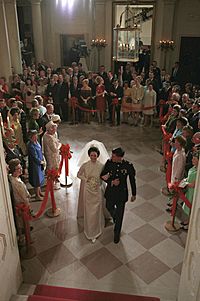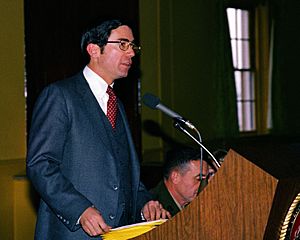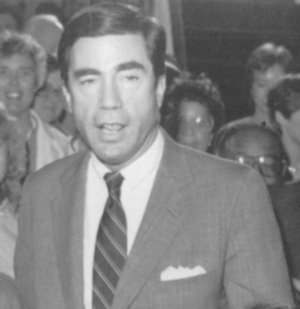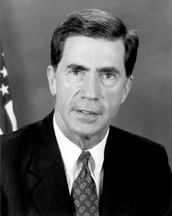Chuck Robb facts for kids
Quick facts for kids
Chuck Robb
|
|
|---|---|
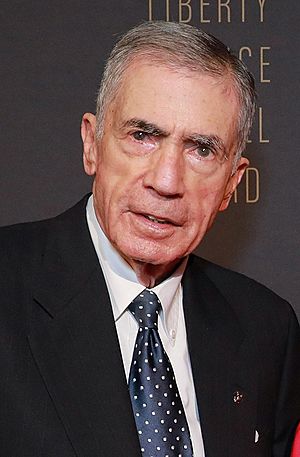
Robb in 2019
|
|
| Chair of the Iraq Intelligence Commission | |
| In office February 6, 2004 – March 31, 2005 Served with Laurence Silberman |
|
| President | George W. Bush |
| Preceded by | Position established |
| Succeeded by | Position abolished |
| United States Senator from Virginia |
|
| In office January 3, 1989 – January 3, 2001 |
|
| Preceded by | Paul Trible |
| Succeeded by | George Allen |
| 64th Governor of Virginia | |
| In office January 16, 1982 – January 18, 1986 |
|
| Lieutenant | Dick Davis |
| Preceded by | John N. Dalton |
| Succeeded by | Gerald L. Baliles |
| 33rd Lieutenant Governor of Virginia | |
| In office January 14, 1978 – January 16, 1982 |
|
| Governor | John N. Dalton |
| Preceded by | John N. Dalton |
| Succeeded by | Dick Davis |
| Personal details | |
| Born |
Charles Spittal Robb
June 26, 1939 Phoenix, Arizona, U.S. |
| Political party | Democratic |
| Spouse | |
| Children | 3 |
| Parents |
|
| Relatives | Lyndon B. Johnson (father-in-law) Lady Bird Johnson (mother-in-law) Luci Baines Johnson (sister-in-law) |
| Residences | McLean, Virginia, U.S. |
| Education | University of Wisconsin, Madison (BA) University of Virginia (JD) |
| Signature | |
| Military service | |
| Allegiance | United States |
| Branch/service | United States Marine Corps |
| Years of service | 1961–1970 |
| Rank | Major |
| Battles/wars | Vietnam War |
| Awards | Bronze Star Presidential Service Badge |
Charles Spittal Robb (born June 26, 1939), known as Chuck Robb, is an American politician and former U.S. Marine Corps officer. He served as the 64th governor of Virginia from 1982 to 1986. He was also a United States senator for Virginia from 1989 to 2001.
Robb is a member of the Democratic Party. He is married to Lynda Bird Johnson, the daughter of the 36th U.S. President, Lyndon B. Johnson. Their wedding in 1967 was a major event held at the White House.
After his time in the Senate, Robb co-chaired the Iraq Intelligence Commission. This group was created to look into the intelligence related to the 2003 invasion of Iraq. He has also served on other important government advisory boards.
Contents
Early Life and Education
Charles Robb was born in Phoenix, Arizona. He grew up near Mount Vernon in Fairfax County, Virginia. After high school, he attended Cornell University and later earned a degree from the University of Wisconsin–Madison in 1961.
After college, Robb joined the United States Marine Corps. He became a social aide at the White House, which is where he met Lynda Johnson. They married in a large ceremony at the White House.
Robb served in the Vietnam War, where he commanded a company of Marines. For his bravery, he was awarded the Bronze Star Medal. After the war, he earned a law degree from the University of Virginia Law School in 1973. He then worked as a lawyer in private practice before entering politics.
Political Career
Robb became active in the Democratic Party in Virginia. He used his skills as a lawyer and his experience as a Marine to build a successful political career.
Lieutenant Governor of Virginia
In 1977, Robb was elected Lieutenant Governor of Virginia. The lieutenant governor is the second-highest official in the state government. He was the only Democrat to win a statewide office that year. This made him an important leader in his party. He served in this role from 1978 to 1982.
Governor of Virginia
In 1981, Robb was elected governor of Virginia. As governor, he was known for being careful with the state's money. He balanced the state budget without raising taxes. He also increased funding for education by $1 billion.
Robb appointed many women and minorities to important state jobs. This included the first African American to serve on the state's Supreme Court. He was also known for helping to create the Super Tuesday primary, which gives southern states more influence in choosing presidential candidates.
United States Senator
In 1988, Robb was elected to the United States Senate. He served two terms, from 1989 to 2001. In the Senate, he was known as a centrist, meaning he often worked with both Democrats and Republicans.
Robb was involved in many important decisions. In 1991, he was one of the few Democrats who voted to allow the use of military force to free Kuwait from Iraqi control. He also voted to confirm Clarence Thomas to the U.S. Supreme Court.
On social issues, Robb was considered more liberal. He supported a ban on certain types of weapons and was against a constitutional amendment to ban flag burning. In 1996, he was the only southern senator to vote against the Defense of Marriage Act.
In 1994, Robb won a very close re-election race against Oliver North. After his re-election, he continued to focus on a strong national defense and responsible government spending. He was the only senator to serve on all three national security committees at the same time: Armed Services, Foreign Relations, and Intelligence. In 2000, he lost his bid for a third term to Republican George Allen.
Life After Politics
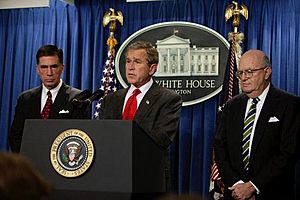
After leaving the Senate, Robb stayed active in public service. He taught at George Mason University School of Law. In 2004, President George W. Bush appointed him to co-chair the Iraq Intelligence Commission. This commission studied the intelligence that led to the 2003 invasion of Iraq.
He has also served on the President's Intelligence Advisory Board and the Iraq Study Group. He is a member of several organizations that focus on national security and responsible government, such as the Council on Foreign Relations and the Committee for a Responsible Federal Budget.
In 2021, he published his autobiography, In the Arena: A Memoir of Love, War, and Politics.
Personal Life
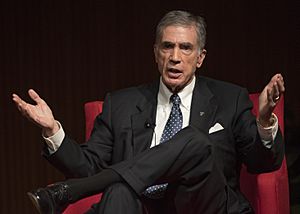
Robb and his wife, Lynda Bird Johnson, have three daughters: Jennifer, Catherine, and Lucinda. They also have five grandchildren. They live in McLean, Virginia.
In December 2021, their home was destroyed in a fire. The couple was hospitalized but recovered from their injuries. The fire destroyed their home and many personal belongings, including books, photos, and historical items they had collected over the years.
Images for kids
 | May Edward Chinn |
 | Rebecca Cole |
 | Alexa Canady |
 | Dorothy Lavinia Brown |


